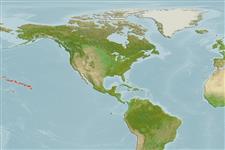Environment: milieu / climate zone / depth range / distribution range
Ekologi
laut bentopelagis; kisaran kedalaman 5 - 380 m (Ref. 5222). Tropical; 30°N - 11°N, 179°W - 153°W (Ref. 5222)
Eastern Central Pacific: known only from the Hawaiian Islands and Johnston Island.
Size / Weight / umur
Maturity: Lm ? range ? - ? cm
Max length : 122 cm TL jantan/; (Ref. 4887); Berat maksimum terpublikasi: 22.7 kg (Ref. 4887)
Duri punggung (Keseluruhan (total)) : 11; duri punggung lunak (Keseluruhan (total)) : 14 - 15; Duri dubur: 3; Sirip dubur lunak: 9. Distinguished by the following characteristics: juveniles greyish brown to dark brown body color with 8 vertical series of white spots on body; adults dark brown with less distinct vertical series of white spots and obscured by numerous additional pale spots and blotches of variable size; fins mostly unspotted; depth of body contained 2.3-2.7 times in SL, width 2.0-2.5 times in depth; head length 2.3-2.5 times in SL; convex interorbital area, width subequal to eye diameter for fish 10-20cm SL; subangular preopercle, 3-5 enlarged serrae at angle; fleshy ventral edge of preopercle, without serrae; smooth edge of interopercle and subopercle or with a few serrae; convex upper edge of operculum; ovate and enlarged posterior nostrils of adults, larger than anterior nostrils (Ref. 89707).
Occurs in deep waters (Ref. 7364). Benthic and benthopelagic (Ref. 58302). Feeds mainly on fish and crustaceans (Ref. 89707). A good fish to eat, fleshy, eaten any way except raw (Ref. 7364). Minimum depth from Ref. 122680.
Life cycle and mating behavior
Kematangan | Reproduksi, perkembang biakan | Pemijahan | telur-telur | Fecundity | Larva
Craig, M.T. and P.A. Hastings, 2007. A molecular phylogeny of the groupers of the subfamily Epinephelinae (Serranidae) with revised classification of the epinephelini. Ichthyol. Res. 54:1-17. (Ref. 83414)
Status IUCN Red List (Ref. 130435: Version 2024-1)
ancaman kepada manusia
Harmless
penggunaan manusia
Perikanan: komersial; Ikan buruan: ya; Akuarium: Komersial
Alat, peralatan
laporan khas
muat turun XML
Sumber internet
Estimates based on models
Preferred temperature (Ref.
123201): 9.3 - 15.3, mean 15.1 °C (based on 3 cells).
Phylogenetic diversity index (Ref.
82804): PD
50 = 0.5001 [Uniqueness, from 0.5 = low to 2.0 = high].
Bayesian length-weight: a=0.01445 (0.00822 - 0.02541), b=3.05 (2.90 - 3.20), in cm total length, based on LWR estimates for this species & Genus-body shape (Ref.
93245).
Trophic level (Ref.
69278): 4.0 ±0.67 se; based on food items.
Daya lenting (Ref.
120179): Rendah, Waktu penggandaan populasi minimum 4.5 - 14 tahun (Preliminary K or Fecundity.).
Fishing Vulnerability (Ref.
59153): High to very high vulnerability (70 of 100).
Nutrients (Ref.
124155): Calcium = 38.4 [18.1, 76.4] mg/100g; Iron = 0.587 [0.297, 1.119] mg/100g; Protein = 17.3 [15.5, 19.1] %; Omega3 = 0.234 [0.132, 0.418] g/100g; Selenium = 108 [53, 231] μg/100g; VitaminA = 22.3 [7.4, 74.3] μg/100g; Zinc = 0.837 [0.566, 1.273] mg/100g (wet weight);
